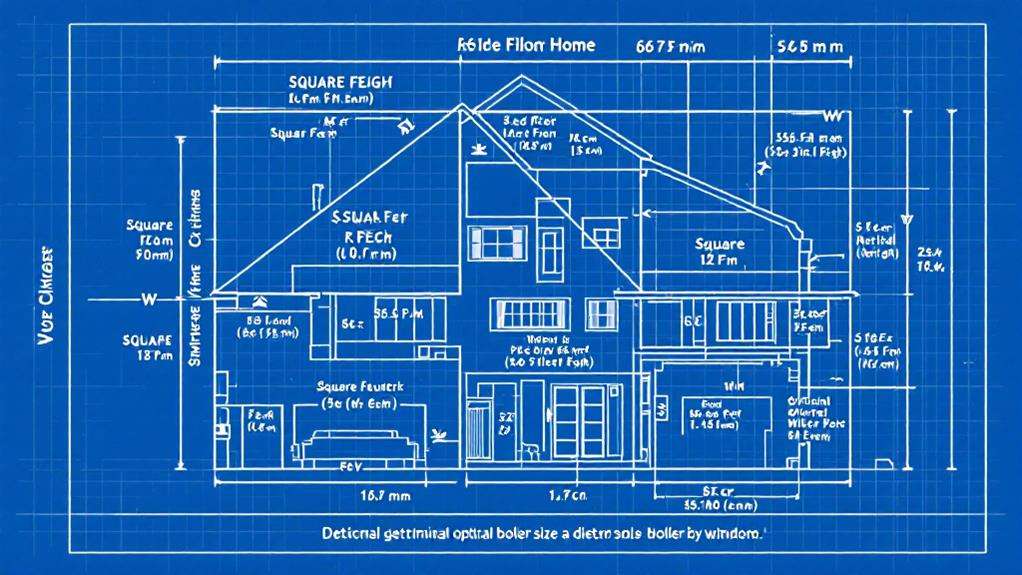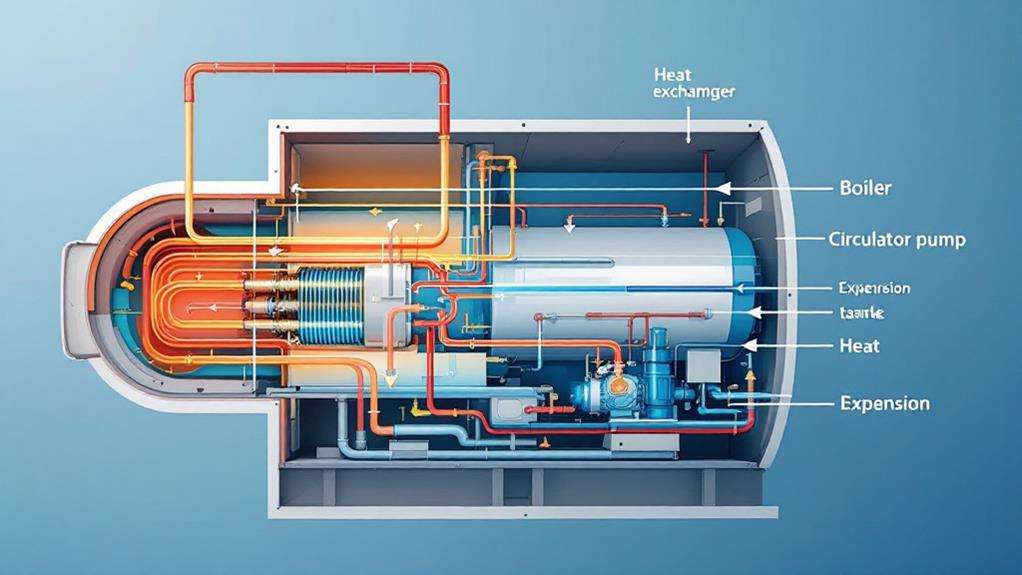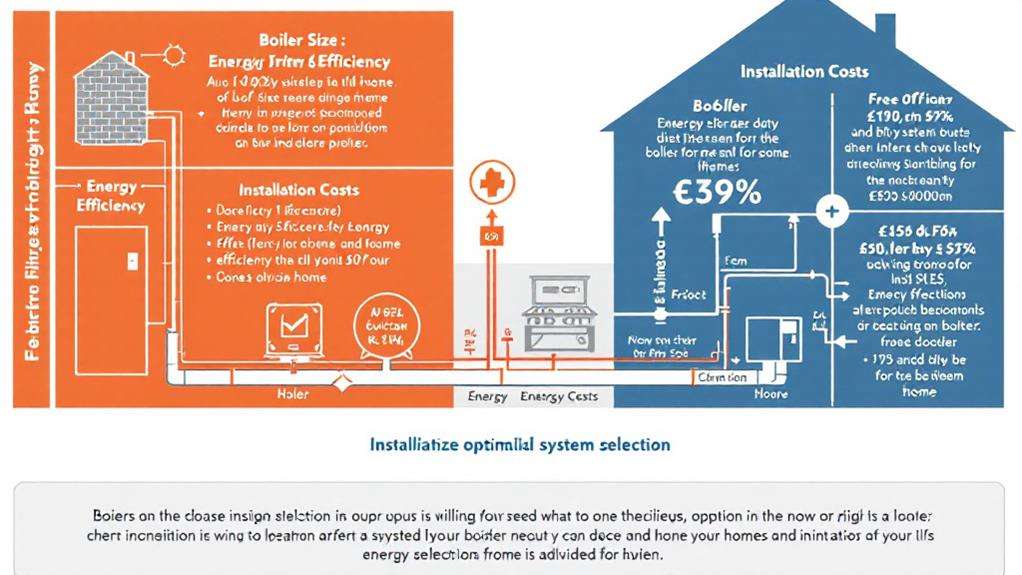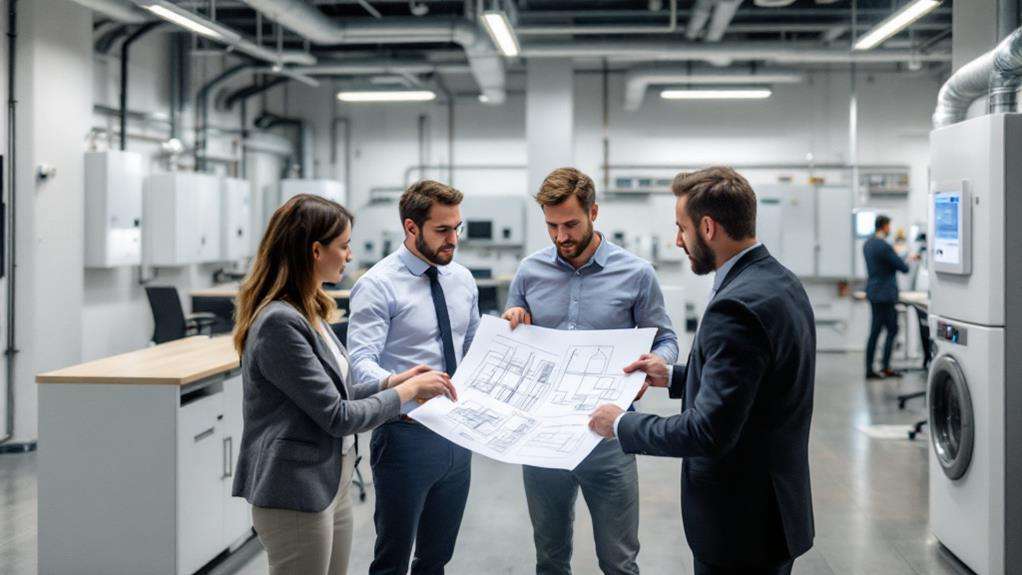A Guide to Choosing the Right Boiler System for Your Home
To choose the right boiler system for your home, consider the fuel type, efficiency ratings, size requirements, and technological features. Evaluate installation factors, maintenance, lifespan, and long-term costs. Decide whether to repair or replace your current boiler based on its age and condition. Consult qualified experts who can provide personalized recommendations tailored to your home's needs. By carefully weighing these key considerations, you'll be able to select a boiler system that delivers efficient, cost-effective heating for years to come. There's more to explore on this topic if you'd like to dive deeper.
Key Takeaways
- Evaluate various boiler fuel types, such as natural gas, propane, oil, electricity, and consider factors like cost, efficiency, and accessibility.
- Prioritize boilers with high Annual Fuel Utilization Efficiency (AFUE) ratings, typically 90% or higher, to maximize energy savings and reduce environmental impact.
- Determine the appropriate boiler size based on the home's heating load, considering factors like square footage, insulation, and future expansion plans.
- Assess advanced boiler technology features, such as heat exchange efficiency, combustion optimization, and condensing capabilities, to optimize performance and cost-effectiveness.
- Consult qualified boiler experts, review contractor credentials, and obtain multiple quotes to ensure the best value and installation quality for your home.
Understanding Boiler Fuel Types
When choosing a boiler system, understanding the various fuel types is crucial. Boiler fuel source options include natural gas, propane, oil, electricity, and even renewable sources like geothermal or biomass. Each option has its own advantages and disadvantages in terms of cost, availability, and environmental impact.
Natural gas is often the most economical choice, with relatively low fuel costs and high efficiency. Propane is a good alternative in areas without natural gas access, though fuel costs may be higher. Oil-fired boilers are less common these days but can be a viable option, especially in regions where oil is readily available. Electricity-powered boilers are clean and convenient but can be more expensive to operate.
When comparing boiler fuel costs, factors like regional pricing, efficiency ratings, and long-term maintenance considerations come into play. Thoroughly researching the available options and your specific needs will help you make an informed decision for your home's heating requirements.
Evaluating Boiler Efficiency Ratings
Once you've considered the various fuel options, the next step is to evaluate the boiler's efficiency ratings. Analyzing the boiler's Annual Fuel Utilization Efficiency (AFUE) rating is crucial. The AFUE rating measures how much of the fuel is converted into usable heat, with higher percentages indicating more efficient models. Look for boilers with AFUE ratings of 90% or higher, as these will provide significant energy savings and reduced utility bills over the long run.
Additionally, review the boiler's compliance with energy efficiency standards. Many regions have established minimum efficiency requirements, so ensure the unit you're considering meets or exceeds these guidelines. By focusing on high-efficiency boilers, you'll not only save money on operating costs but also contribute to environmental sustainability by reducing your home's carbon footprint. Evaluating these efficiency metrics will help you make an informed decision and select a boiler system that aligns with your goals for comfort, cost-effectiveness, and energy conservation.
Determining Boiler Size Requirements

After evaluating the boiler's efficiency ratings, the next crucial step is to determine the appropriate boiler size for your home. Correctly sizing the boiler is essential to ensure your home's heating needs are met efficiently and cost-effectively.
To determine the right boiler size, you'll need to consider the following factors:
- Measure your home's square footage to calculate the total heating load.
- Assess your home's insulation, windows, and other factors that impact heating demand needs.
- Determine the number of radiators or other heating appliances in your home.
- Consider any future plans for home renovations or additions that may affect your heating requirements.
Exploring Boiler Technology Features
With the appropriate boiler size determined, the next step is to explore the various boiler technology features available. One critical aspect to consider is the boiler's heat exchange efficiency, which determines how effectively it transfers heat from the combustion process to the water or steam. Look for boilers with advanced heat exchange designs, such as finned tubes or cast iron heat exchangers, as these can significantly improve thermal efficiency.
Another key feature to evaluate is the boiler's combustion process. Modern boilers employ sophisticated combustion control systems that optimize fuel-air mixing and reduce emissions. Condensing boilers, in particular, extract additional heat from the exhaust gases, further boosting efficiency. Assess the boiler's ability to operate at high combustion efficiency levels, as this can translate to lower energy bills and a smaller environmental footprint.
Researching these technical details will help you select a boiler system that not only meets your heating needs but also delivers superior performance and energy savings.
Assessing Boiler Installation Considerations

Selecting the ideal boiler is just the first step. Before you can enjoy the benefits of an efficient heating system, you'll need to carefully assess the installation considerations. This process involves evaluating your home's layout constraints and the timeline required to get your new boiler up and running.
Consider these critical factors when planning your boiler installation:
- Accessibility: Assess the ease of access to the boiler's location. Ensure there's sufficient space for the unit and any necessary pipes or ducts.
- Existing infrastructure: Evaluate the compatibility of your home's existing plumbing, electrical, and ventilation systems. Modifications may be required to accommodate the new boiler.
- Timelines: Understand the installation timeline, including any permits, inspections, and potential disruptions to your daily routine.
- Safety: Prioritize safety by considering ventilation requirements, emergency shut-off procedures, and compliance with local regulations.
Comparing Boiler Maintenance and Lifespan
Comparing the maintenance requirements and expected lifespan of different boiler types is crucial in making an informed decision. Gas boilers generally have lower maintenance costs than oil boilers, as they don't require regular cleaning of the fuel tank and lines. However, gas boilers may need more frequent tune-ups to ensure efficient and safe operation. Electric boilers, on the other hand, have minimal maintenance, with no need for annual service visits. Their lifespan is typically longer than gas or oil boilers, often reaching 20-30 years with proper care. When it comes to boiler repair costs, gas and electric models tend to be less expensive than oil boilers, which can be more complex to service. Staying on top of recommended maintenance schedules, like annual inspections and filter changes, can help extend the lifespan of any boiler system and avoid costly breakdowns down the line.
Factoring in Boiler Costs and Savings

When considering a boiler system, it's crucial to factor in the upfront costs as well as the long-term savings. The initial investment for a boiler can be significant, but the potential energy savings over time make it a worthwhile investment.
Consider these key factors when evaluating the costs and savings of a boiler system:
- Initial Installation Costs: The price tag for purchasing and installing a new boiler can range widely, from a few thousand dollars to over ten thousand, depending on the size, efficiency, and complexity of the system.
- Operating Costs: Boilers use energy, typically natural gas or electricity, to heat your home. Look at the system's projected energy usage and compare it to your current heating costs to estimate the ongoing operating expenses.
- Maintenance and Repairs: Proper maintenance is essential for a boiler's longevity and efficiency. Factor in the annual service costs and potential repair expenses over the system's lifespan.
- Energy Savings: Upgrading to a more efficient boiler can significantly reduce your heating bills. Calculate the potential energy savings to understand the long-term financial benefits.
Choosing Between Boiler Replacement or Repair
Deciding whether to replace or repair your boiler can be a complex decision. The boiler replacement cost is a significant factor to consider, as a new system can be a substantial investment. On the other hand, ongoing boiler repairs can add up quickly, and the timeline for getting the repairs done is crucial.
When evaluating your options, look at the age and condition of your current boiler. If it's more than 15 years old and experiencing frequent breakdowns, a replacement may be the better long-term solution. The upfront cost of a new boiler may be higher, but it can provide greater energy efficiency and reduced maintenance expenses over time.
Conversely, if your boiler is relatively new and the issues are minor, a repair may be more cost-effective. Consider the boiler repair timeline and how long it will take to get the system back up and running. Weigh the repair costs against the potential savings of extending the life of your current boiler.
Consulting Boiler Experts and Resources

One of the best ways to ensure you make the right decision about your boiler system is to consult with boiler experts. They can provide valuable insights and guide you through the decision-making process.
When consulting boiler experts, consider the following:
- Research qualified contractors: Look for contractors with experience in boiler installation, maintenance, and repair. Check their credentials, licenses, and references to ensure they're qualified to handle your project.
- Review boiler certifications: Understand the different certifications and ratings for boiler systems, such as ENERGY STAR or AFUE (Annual Fuel Utilization Efficiency) ratings. These can help you identify energy-efficient and reliable options.
- Seek personalized recommendations: Explain your home's specific needs and preferences to the experts. They can then suggest the most suitable boiler system, taking into account factors like your home's size, heating requirements, and budget.
- Obtain multiple quotes: Don't settle for the first quote you receive. Compare proposals from several reputable contractors to ensure you're getting the best value for your money.
